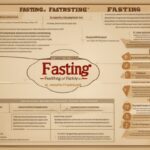As we age, maintaining health and vitality becomes a top priority. For many seniors, exploring dietary strategies like fasting can offer a promising path to better wellness. fasting for seniors isn’t just a trend; it’s a practice rooted in science that may support weight management, improve metabolic health, and even enhance brain function. But is it safe for older adults? How can seniors fast without compromising their health? In this comprehensive guide, we’ll dive into the world of intermittent fasting for seniors, explore its benefits, address potential risks, and provide practical tips to make fasting a sustainable part of life. Whether you’re a senior yourself or helping a loved one, let’s uncover how fasting can fit into healthy aging.
What Is Fasting, and How Does It Work for Seniors?
Fasting, at its core, is a practice of voluntarily abstaining from food for a specific period. For seniors, the most common approach is intermittent fasting (IF), which involves cycling between periods of eating and fasting. Popular methods include the 16:8 plan (fasting for 16 hours and eating during an 8-hour window) or the 5:2 method (eating normally for five days and restricting calories on two non-consecutive days). When done correctly, fasting can trigger a state called ketosis, where the body burns fat for fuel, and autophagy, a cellular cleanup process that may slow aging. For older adults, fasting seniors can be a gentle way to reset metabolism, but it requires careful planning to avoid nutrient deficiencies or energy dips.
Key Benefits of Fasting for Seniors
The potential benefits of fasting for older adults are backed by a growing body of research. While results vary, studies suggest that intermittent fasting can positively impact several aspects of health that are especially relevant to aging. Here are some scientifically supported advantages:
- Improved Metabolic Health: Fasting may enhance insulin sensitivity, helping to manage blood sugar levels—a critical factor for seniors at risk of type 2 diabetes.
- Weight Management: As metabolism slows with age, fasting can support healthy weight loss or maintenance by reducing overall calorie intake.
- Brain Health: Some research indicates that fasting boosts the production of brain-derived neurotrophic factor (BDNF), a protein linked to cognitive function and protection against neurodegenerative diseases.
- Heart Health: Fasting may lower blood pressure, cholesterol, and inflammation markers, reducing the risk of cardiovascular issues common in older age.
These benefits make senior fasting an appealing option, but it’s essential to approach it with caution and personalization based on individual health needs.
Potential Risks and Challenges of Fasting for Seniors
While fasting offers promising benefits, it’s not without challenges, especially for older adults. Aging bodies have unique nutritional and energy requirements, and fasting without proper guidance can lead to unintended consequences. For instance, prolonged fasting might cause muscle loss, fatigue, or dehydration—issues that seniors are already more vulnerable to. Additionally, those with chronic conditions like diabetes or heart disease must be cautious, as fasting can affect medication timing or blood sugar stability. It’s also worth noting that fasting may exacerbate feelings of hunger or irritability in some individuals, potentially impacting mood or daily routines. Understanding these risks is the first step to ensuring that fasting for seniors is both safe and effective.
How Seniors Can Start Fasting Safely
If you’re a senior curious about fasting, or you’re supporting an older loved one, starting slowly and safely is key. The goal isn’t to jump into extreme fasting protocols but to ease into a routine that complements your lifestyle and health status. Here are some actionable tips to help older adults fasting begin their journey:
- Consult a Healthcare Provider: Before starting any fasting regimen, speak with a doctor or dietitian, especially if you have pre-existing conditions or take medications.
- Start with a Mild Approach: Try a 12:12 fasting schedule (12 hours fasting, 12 hours eating) to get accustomed to the concept before progressing to longer fasts like 16:8.
- Stay Hydrated: Drink plenty of water during fasting windows to prevent dehydration, a common concern for seniors.
- Focus on Nutrient-Dense Meals: When eating, prioritize protein, healthy fats, and fiber to maintain muscle mass and energy levels.
- Listen to Your Body: If you feel dizzy, weak, or unwell, stop fasting and reassess with professional guidance.
By taking these steps, seniors can explore intermittent fasting seniors with minimal risk and maximum benefit.
Customizing Fasting for Senior Health Conditions
Not all seniors are the same, and health conditions play a significant role in how fasting should be approached. For instance, seniors with diabetes need to monitor blood sugar closely and may require adjusted medication schedules during fasting. Those with heart conditions should avoid drastic calorie cuts that could strain the body. If osteoporosis is a concern, ensuring adequate calcium and vitamin D intake during eating windows is crucial to protect bone health. Working with a healthcare team to tailor a fasting plan can make all the difference. Remember, fasting seniors isn’t a one-size-fits-all solution—it’s about finding what works for your unique body and circumstances.
Combining Fasting with a Senior-Friendly Lifestyle
Fasting doesn’t exist in a vacuum; it’s most effective when paired with other healthy habits. For seniors, this means integrating fasting into a balanced lifestyle that supports overall well-being. Light physical activity, such as walking or yoga, can complement fasting by maintaining muscle strength and boosting mood. Adequate sleep is also vital, as it supports the body’s repair processes during fasting. Additionally, social support—whether from family, friends, or a fasting community—can provide motivation and accountability. By weaving fasting for older adults into a holistic routine, seniors can maximize the benefits while minimizing potential downsides.
In conclusion, fasting for seniors holds incredible potential as a tool for healthy aging, offering benefits like improved metabolism, better brain health, and weight management. However, it’s not a magic bullet and requires careful consideration of individual health needs, risks, and lifestyle factors. By starting slowly, consulting professionals, and prioritizing nutrition and hydration, seniors can safely explore intermittent fasting as part of their wellness journey. Whether you’re looking to boost energy or support long-term health, fasting could be a valuable addition to your routine—just take it one step at a time. Have you or a loved one tried fasting? Share your experiences or questions below; we’d love to hear from you!






